After President Obama’s address to the nation last night, Shambhala Sun “Earth Dharma” blogger Jill S. Schneiderman had mixed feelings: “As much as I was glad to hear him assert that we must pay attention in this moment and move forward on alternative energy initiatives, I was sorry to hear the commander-in-chief’s lingo.” What, she wonders, would our relationship with the earth be like if we approached it from a position of unity and love rather than separation and aggression?
As I was driving my children to their school in Bridgetown Barbados today—my partner is a Fulbright Fellow at the University of the West Indies on the island—I stopped the car to allow some older people to cross the street. One woman wore a shower cap, a bathrobe swaddled another member of the group of five, and one of the men had on swim trunks and carried a bath towel. It was 7:30 a.m. and the assemblage had just emerged from Payne’s Bay, a stretch of calm, blue Caribbean Sea after their morning sea bath.
Sea bath is a daily ritual here, mostly for older folks who I suppose grew up with the tradition—and without household plumbing—or the younger underemployed. Regardless, I was reminded, as I am every morning when I see bathers along various stretches of Barbados’ coastline of how important the sea is to the life of Bajans. Of course, there are more obvious relationships between people and the sea here, in the form of fishmongers, water sports purveyors, and boat makers. But the ritual of sea bath holds a level of intimacy with the earth that to my mind is matched only when Spiritual Baptists worship in “open air” services involving “living waters.”
As I paused for the bathers to cross the street and return home to continue their daily activities, my mind drifted to the residents of southern Louisiana whose way of life is currently rent asunder by the oil oozing from the BP/Transocean puncture wound to the Earth’s thin skin—the ocean crust is no more than 35 km thick and can be visualized accurately in scale if pictured as the shell on a hard boiled egg. Had the Deepwater drilling accident taken place off the coast of Trinidad and Tobago, a fossil fuel-rich island nation off the coast of Venezuela and roughly 150 miles from Barbados, the crisis we Americans confront in the Gulf of Mexico would be disrupting the sea-based life of Barbadians today.
I listened carefully along with others last night as President Obama addressed the nation on the topic of the oil disaster. I’m glad that our President has been to southern Louisiana four times already and that he will meet with the head of BP to hold that company responsible. But I was disappointed to hear our intelligent and well-intentioned President in our current predicament resort to the familiar military metaphors. He talked about our “siege,” “battle,” and “assault” on the oil. As feminist geographer Joni Seager pointed out many years ago in her fine book Earth Follies: Coming to Feminist Terms with the Global Environmental Crisis, it seems that our government must always conjure an enemy with which to fight. Whether it’s a war in Afghanistan or Iraq, or a “war on drugs,” we resort to martial images when crisis arises. Do we do so because such representations prop up masculinity? Does this type of depiction make us feel more secure in uncertain situations?
As much as I was glad to hear President Obama assert that we must pay attention in this moment and move forward on alternative energy initiatives—renewable ones like solar and wind—I was sorry to hear the commander-in-chief’s lingo. What would our relationship with the earth be like if we approached it from a position of unity and love rather than separation and aggression? The sea birthed life on this planet. Before the first land emerged—while we know the planet to be 4.6 billion years old based on the ages of meteorites and the concomitant formation of our solar system, our oldest record of solid ground is rocks that are only 4.28 billion years old—there was no outer rock sphere, only a hydrosphere and thin atmosphere. The sea is our ultimate source. Does it not require our reverence?
I’m reminded of the poem “In the Salt Marsh,” by my friend, Nancy Willard:
How faithfully grass holds the shape of the sea it loves,
how it molds itself to the waves, how the dried salt
peaks into cowlicks the combed mane of the marsh.
Tousled by tides, it pitches tents, breaks into turrets
and cockscombs and whorled nests and green baskets
for the bleached armor of fiddler crabs, like earrings
hung by the sea on lobes of darkness. Could I lay my ear
on that darkness where the tide’s trowel smooths islands
and scallops the sand, moon-tugged, till it slows
and turns? Could I keep the past in the present’s eye?
Could I know what the grass knows?
Living on this tiny coral island I’ve felt fortunate to be among people whose daily lives acknowledge our debt to the sea. Despite the money to be made if excessive development were allowed on Barbados’ east coast, as it has been on the west coast of the island, Bajans mostly stand against such coastal augmentation. They already live with plentiful trash that washes up on the island’s eastern shores from transoceanic vessels that dump all sorts of waste–including oily bilge—into the sea. Can we know what old-time Bajans know?
Preeminent teacher of Tibetan Buddhism Chögyam Trungpa Rinpoche wrote:
Everything is based on our own uptightness. We could blame the organization; we could blame the government; we could blame the food; we could blame the highways; we could blame our own motorcars, our own clothes; we could blame an infinite variety of things. But it is we who are not letting go, not developing enough warmth and sympathy—which makes us problematic. So we cannot blame anybody.
Since the Deepwater disaster in the Gulf of Mexico began in April much talk has focused on the question of who is at fault? Of course we want to avoid another incident of this type and I’m glad that President Obama has banned such drilling for at least six months. But question that will stay with me as I ponder this latest insult to the Earth System is “Can we know what the grass knows?”

